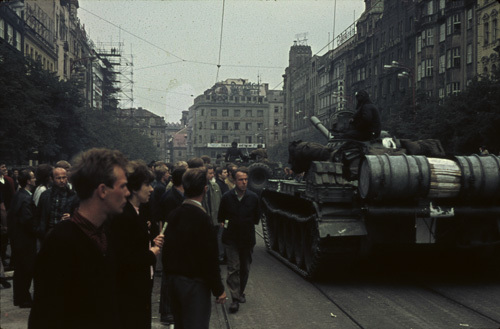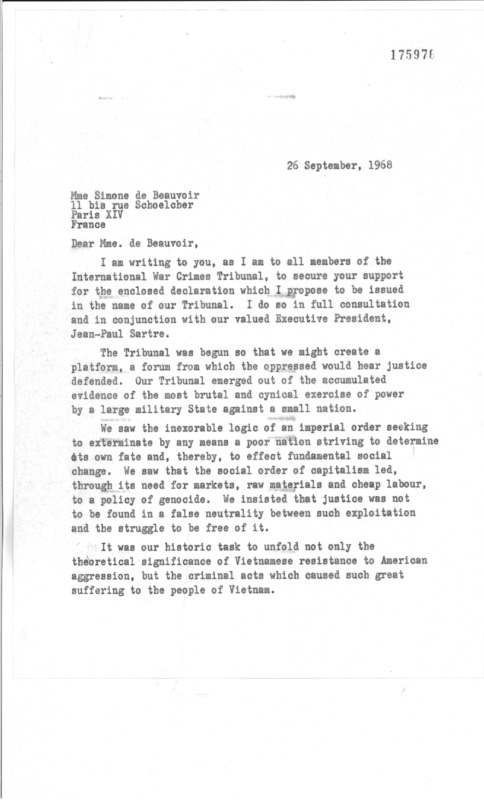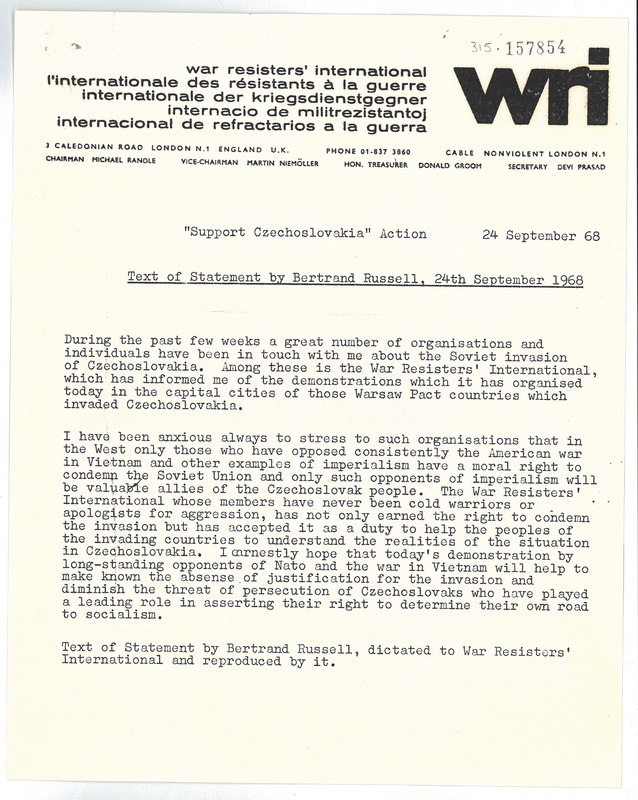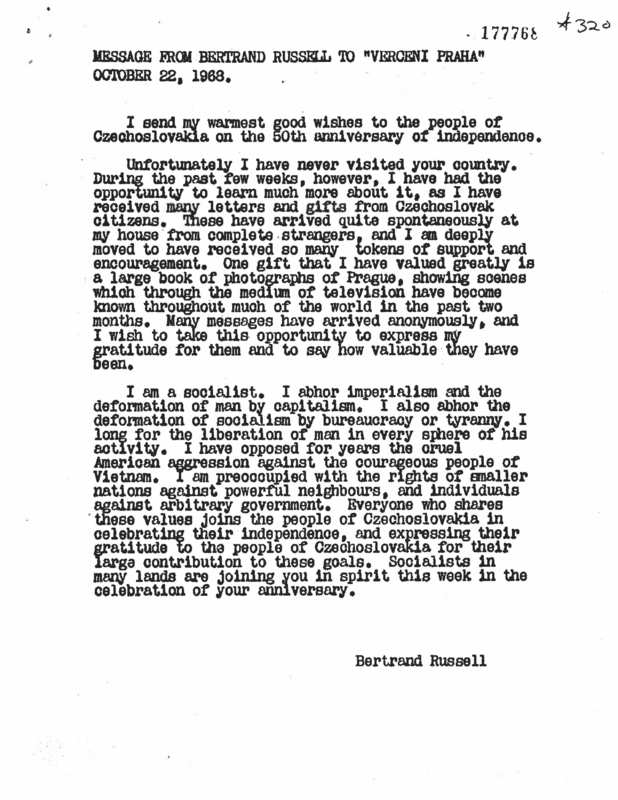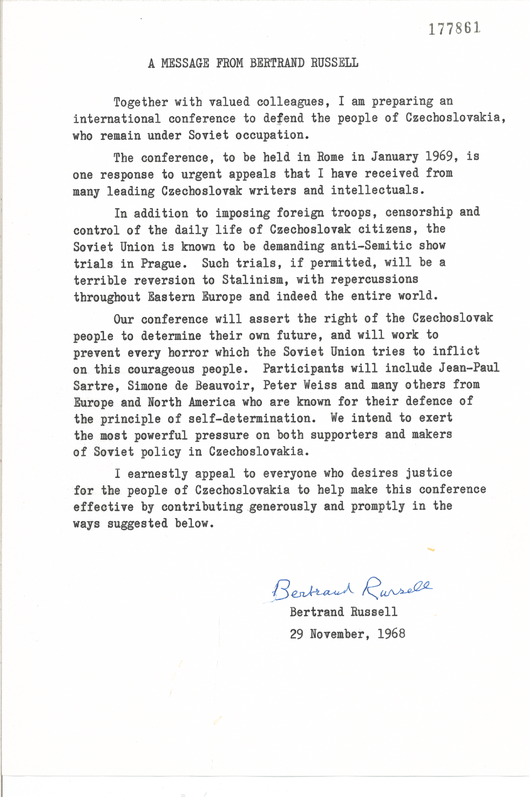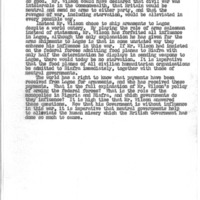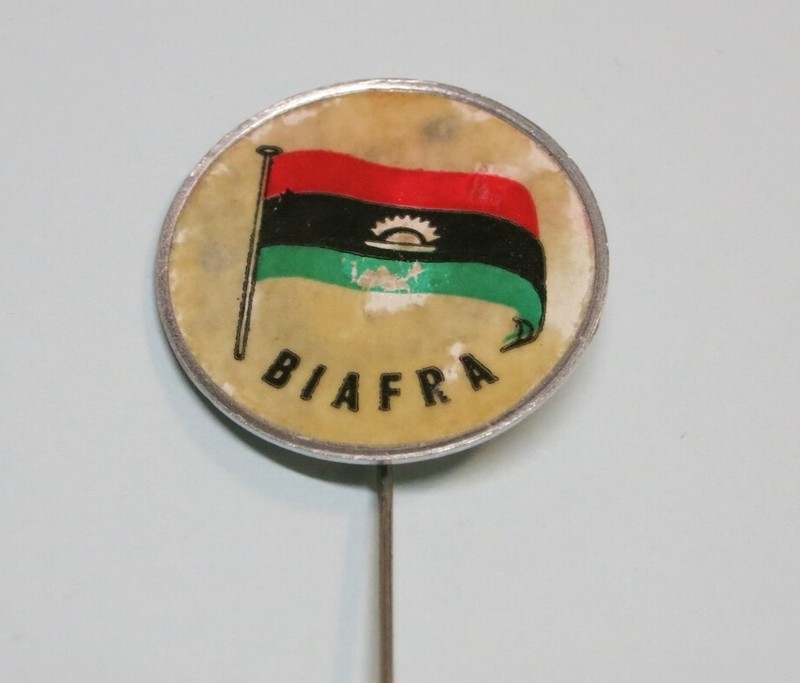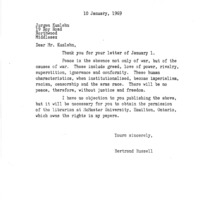The Prague Spring and Soviet Invasion of Czechoslovakia
The most dramatic and significant events of 1968 – if not of the Cold War writ large – occurred in Czechoslovakia. Beginning in January, with the liberalizing policies of the reformist Alexander Dubček, Czechoslovakia experienced an eight-month period of mass protest. The 'Prague Spring’ ended on 21 August 1968, when Warsaw Pact tanks rolled through the streets of Prague, and the Soviets engaged in a brutal occupation to restore hardline Communist rule.
The political crisis of Czechoslovakia came as a shock to the global Left. Characteristically, Bertrand Russell felt compelled to act. He hoped that the authority of the International War Crimes Tribunal, which had concluded its adjudication of American aggression in Vietnam a year earlier, could be deployed against the tyrannical actions of the Soviet Union. He wrote to each member of the IWCT, asking for support for a resolution to condemn Soviet aggression. “An invasion of a sovereign people for the purpose of denying their right to determine their own social ends is a war crime in complete conformity with the definition established by the Tribunal,” he wrote. He received broad support from his fellow Tribunal members with the sole exception of Amado Hernandez, a Filipino labour leader and activist, who was sympathetic to the Soviet interpretation of the crisis. “It would appear [that] you are gravely misinformed” Russell replied (108621). In his statements, Russell asserted his ideological belief in socialism, but his stronger belief that the people of Czechoslovakia have the “right to determine their own road to socialism” against the tyranny of imperialism. He called upon “all socialists and communists in every continent” to collectively protest and organize demonstrations at Soviet embassies across the world (66110).
War in Biafra
The forgotten war of the late 1960s – the Nigerian Civil War or, the Nigeria-Biafra War – should be remembered alongside Vietnam and Czechoslovakia as one of the era's most terrible tragedies. By mid-1968, the war had reached a horrific climax, with images of starving Biafran children dominating the nightly news of Western media. The food crisis in Biafra became a dominant political cause in Europe, witnessing a significant rise in international funding for relief efforts and non-governmental activist work.
On the second day of January 1968, the Bertrand Russell Peace Foundation sent a cable to Nigerian Major-General Yakuba Gowon, protesting the arrest of the future poet laureate, Wole Soyinka. In Russell’s words, the arrest “disgraces your Government” (68706). Throughout the war, Russell remained observant of the events on the ground as the clippings of the war coverage in his archive attests. He maintained correspondence with the London-based ‘Save Biafra’ Committee, with whom he mounted public pressure on British Prime Minister Harold Wilson, whose government was supplying arms and military equipment to the Nigerian government.
In 1969, Russell would formally join the “Medical Aid for Biafra” along with A.J. Ayer and Lord (Fenner) Brockway, Hugh Fraser, M.P. This group was founded to dispatch supplies in emergency cases, 25 million capsules of chloroquine and 25 million aspirin tablets needed immediately to fight a country-wide malaria outbreak.
Conclusion: Bertrand Russell in 1969
On January 10, 1969, Russell sent a letter to a friend looking for a quote on peace. Russell wrote, "Peace is the absence not only of war, but of the causes of war. These include greed, love of power, rivalry, superstition, ignorance and conformity. These human characteristics, when institutionalized, become imperialism, racism, censorship and the arms race. There will be no peace, therefore, without justice and freedom."
A more succinct summary of Russell's ideas on peace would be hard to find. The letter continues with Russell stating something which reflects the monumental change that had occurred in the previous year, which would forever cement the legacies of both Russell and McMaster University: "I have no objection to you publishing the above, but it will be necessary for you to obtain the permission of the librarian at McMaster University, Hamilton, Ontario, which owns the rights in my papers".
Bibliography
- Bischof, Günter, Karner, Stefan, and Ruggenthaler, Peter, eds. The Prague Spring and the Warsaw Pact Invasion of Czechoslovakia In 1968. Blue Ridge Summit: Lexington Books/Fortress Academic, 2009.
- Daly, Samuel Fury Childs. A History of the Republic of Biafra: Law, Crime, and the Nigerian Civil War. Cambridge: Cambridge University Press, 2020.
- McAlister, Melani. “Picturing the War ‘No One Cares About.’” Humanities 44, no. 2. Spring 2023. https://www.neh.gov/article/picturing-war-no-one-cares-about.
